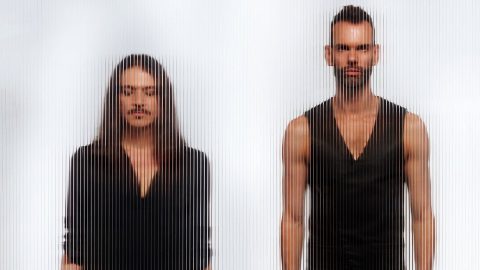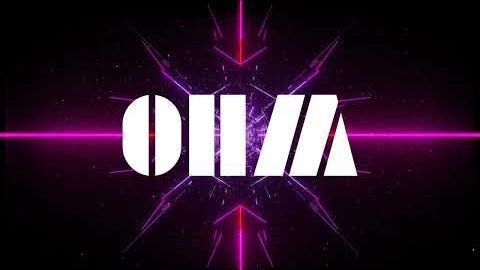
Dayglow’s Sloane Struble created his debut album ‘Fuzzybrain’ alone in his bedroom, without telling another living soul what he was up to. Using it as an outlet for the growing pains that come with high school and inspired by the DIY efforts of Clairo and Boy Pablo, he uploaded the record to Spotify just as he was about to leave his hometown of Aledo, Texas for the state’s musical Mecca of Austin. “I didn’t think about it too much because I knew if I did, I would think about it too much,” Struble tells NME over Zoom. “I’m an overthinker.”
Rather than chasing popstar dreams he was going to college to study advertising, but a week into his first semester though, the warm bedroom pop of ‘Fuzzybrain’ had taken off and achingly hopeful tracks like ‘Can I Call You Tonight?’ had viral moment after viral moment: favourable playlisting, cosigns from YouTube stars and that royalty-free green screen music video lead to 210 million streams and counting.
Written pre-pandemic, Dayglow’s new album ‘Harmony House’ “is what happened since I clicked upload,” he says. “It’s the next chapter of my life” and buoyed by the relentless success of his debut, “it’s definitely more ambitious.”
It hasn’t come at the expense of the heartfelt honesty that made ‘Fuzzybrain’ so relatable though: ‘Close To You’ is a disco-infused anthem of unsaid things while the big, acoustic jam of ‘Woah Man’ is an encouraging message of growth. “If this album does sound more radio friendly, that wasn’t me trying to make pop hits,” he explains. “I just learned how to mix better.”
We spoke to the bedroom pop artist about moving on from the lo-fi set-up, the fictional sitcom that ‘Harmony House’ soundtracks and why the world needs optimistic music more than ever right now.
How does ‘Harmony House’ differ from ‘Fuzzybrain’?
“‘Fuzzybrain’ was about wanting to grow up and feeling really anxious. Harmony House is about being forced to discover myself quickly as well as dealing with the sudden attention that I got. I wanted to be really honest about everything that’s happened to me over the past couple of years and talk about some of the overwhelming things I went through. I always wanted Dayglow to be as personal as possible but now I know people are listening, I can speak to them through my music. It’s like a conversation with friends.”
Musically what were you inspired by this time?
“I was listening to all the iconic giants of 80s pop; Michael McDonald, Paul Simon, James Taylor, Whitney Houston. I was really fascinated by the personality, the music and how much pop has changed since. I wanted to dive into what made songs like ‘I Want To Dance With Somebody’ so timeless. There’s definitely an 80’s revival happening right now but it feels like a lot of it is being compromised or watered down. I wanted to capture the weird, gritty elements of the 80s because I love how cool that whole decade was. There’s more to the album than that though. I don’t want to be an Elvis impersonator and I don’t want to be The Eighties Guy.”
If ‘Harmony House’ is the start of a conversation, what did you want to say?
“There’s so much pressure to know absolutely everything right now but I’m convinced that no one really knows what they’re doing. And that’s OK, but there’s so much music that says the opposite. It’s something that attracted me to ’70s and ’80s music in the first place, because it felt more communal. It acknowledged the people around you. A lot of pop these days makes it feel like you’re the main character and that ego boost is fun, but I wanted to make music that encourages people to listen to their neighbours.”
Was there more pressure following the success of ‘Can I Call You Tonight’?
“I didn’t think ‘Can I Call You Tonight’ was going to blow up like it did but I’ve been trying to let that song live on its own. Hopefully it’s a gateway into everything else I make. There are some days where there’s a lot of pressure and the self-doubt kicks in, especially because I do it all myself, but mostly I just feel super thankful. That’s the key to not driving yourself mad.”
So there’s no ‘Can I Call You Tonight’ part 2 on ‘Harmony House’?
“I’ve always respected artists who really evolve as time goes on and it would drive me crazy if I kept trying to be that version of myself. ‘Fuzzybrain’ was written when I was 17 so to do another song like ‘Can I Call You Tonight’, it’d feel like I wasn’t able to grow up. I’m confident in what I’m doing now. It also feels like people are along for the ride.”

How are you finding musical success because it sounds like you weren’t prepared for it at all?
“I was going to school for advertising and I assumed I was going to do that as a career. Maybe in my spare time, I’d be producing for other people but I don’t think there would be a reality where I wouldn’t be making music. It’s really therapeutic for me. Some people watch Netflix, I write and produce. I didn’t tell people about Dayglow because I was scared of failure. I went to a college prep school and it felt really weird in that environment to say ‘I don’t really care about college, I want to make music’. I’m still figuring out how to take myself seriously as an artist. It feels so funny to me because I have it so deeply implanted in my mind that this isn’t a real job.”
The new album is inspired by sitcoms like Cheers, right?
“The initial idea was to write a soundtrack for a sitcom that doesn’t exist. The internet has created this thing I call false nostalgia and there’s this odd cultural moment where people my age watch old shows or listen to music and feel genuinely nostalgic for something we never experienced. I wanted to tap into that. Also, I felt like I was living in a sitcom after the success of ‘Fuzzyhead’. It felt like I had a laugh track to my life and the whole thing was like The Truman Show.”
“If this album does sound more radio friendly, that wasn’t me trying to make pop hits: I just learned how to mix better”
Do you still consider yourself a bedroom pop artist?
“I saw Bedroom Pop as a bunch of people in high school making music by themselves, but none of them wanted to be doing the production side of things. Initially, I wanted Dayglow to fit alongside that scene but I’d be the gear nerd who was really trying to get out of the bedroom. I put an album out of pop music made in my bedroom so it made total sense at the time, but what I do is indie. It’s mostly inspired by Two Door Cinema Club, Phoenix, MGMT and bands like that. ”
Dayglow is all about positivity, right?
“Naturally I’m an optimistic person and the music reflects that. If there was ever a time that optimism was needed, it’s now. The challenge was to talk about really honest, personal stuff but still make it feel hopeful but saying that now makes it sound so Disney. One of the difficulties is finding a way to make optimistic music not seem ignorant. That said, I’m still navigating the scope of the power I have in my hands as an artist. I’m not going to reject talking about something else if I feel passionate about it.”
What’s next?
“I’d love to start working with other artists and I’m building my own studio here in Austin which will be dope. Dayglow is my personal outlet to do whatever I want and I’m already working on album three which feels a lot more New Wave. Going forward, Dayglow is just going to keep reflecting who I am at that stage in my life. As much as I think optimistic music is needed, I think an honest person is needed more, so I’m trying to be that.”
Dayglow’s new album ‘Harmony House’ is released May 21
The post Dayglow’s new album is what happens when bedroom pop leaves home appeared first on NME.





